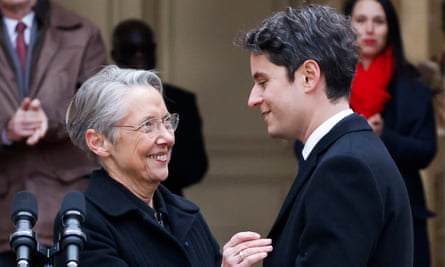As Gabriel Attal, France’s new prime minister, hastily made his first trip to the northern Pas‐de‐Calais to assess flood damage and reassure struggling residents and local politicians on Tuesday, it symbolised the challenges that await him.
A popular former government spokesperson and master political communicator, Attal was chosen to boost government by the centrist Emmanuel Macron who is approaching the two-year mark of his difficult second term with dipping approval ratings and facing voters’ growing distrust of politics in general.
But the task is difficult for the man who has become modern France’s youngest-ever prime minister. His first job is to appoint a new government this week according to Macron’s wishes – defining whether it will lean firmly to the right or, balance with some figures from the left. Attal is expected to continue Macron’s second-term agenda that has drifted to the right as the president seeks to appeal to conservative voters in an attempt to counter the growing popularity of Marine Le Pen’s far right.
The new government must also reflect gender balance, with women in senior government roles. He takes over as prime minister from Élisabeth Borne, who is only the second woman to have held the job, and whose parting shot as she was reluctantly made to leave by Macron, was to warn that much remained to be done on equality.
Attal’s real challenge will come when he sets out his political project in parliament in the coming days. He has promised to prioritise business, young people and better remunerate work, while focusing on schools and education. But he is expected to face the same difficulties passing legislation in parliament that plagued his predecessor. Since Macron’s centrists lost their absolute majority in parliament elections in 2022, the risk of deadlock has hung over the prime minister. Borne, who survived 30 motions of no confidence, was forced more than 20 times to use a special constitutional measure to push through legislation without a parliament vote.
When Macron’s unpopular raise in the pension age was pushed through without a vote last year, it provoked street demonstrations. More recently a hardline immigration law was passed that incorporated many ideas of the right and was deemed an “ideological victory” by Le Pen’s party. Constitutional experts will decide in the coming weeks whether some of the measures are anti-constitutional.
The controversy over the immigration law is not yet over. This month, Attal will inherit a promised new bill on emergency health access for undocumented foreigners, which critics on the left said could pander to the right. It is not clear what Attal’s personal position is on this issue. He will also have to steward long-awaited legislation on changes to palliative care, including possible moves toward a form of assisted dying.

The ultimate challenge for Attal in coming months is to try to limit the gains of the far right in June’s European elections. The staunchly pro-European Macron built his political persona on promising to restore French people’s trust in the EU and faith in the European project. But Marine Le Pen’s anti-immigration National Rally party, which is already the biggest single opposition party in the French parliament, is now polling significantly ahead of Macron’s centrists for the European parliament elections.
The June vote will be seen as a kind of midterm test for Macron’s ability to hold back the far right. Jordan Bardella, 28, the president of Le Pen’s party, who has had several heated TV debates with Attal, is leading the National Rally’s European campaign and, like Attal, has recently increased in popularity in polls.
One of the key reasons Attal was chosen by Macron was that he is currently among France’s best-liked politicians, a calm and skilled communicator, who has gained public support by speaking openly about his life, including his experience of bullying as a teen. But if Attal recently ranked third in the list of politicians whom French people would like to have a beer with (Marine Le Pen came ahead of him in second place), his challenge now lies in working behind the scenes. He must bring back together Macron’s split and divided centrist grouping – which fell out over the recent immigration law. At the same time, he must appeal to law makers on the right in order to pass legislation.
Benjamin Lucas, a Green MP, said Attal’s appointment was a “change of casting” but ultimately, “everything is decided” in Macron’s Élysée office.

